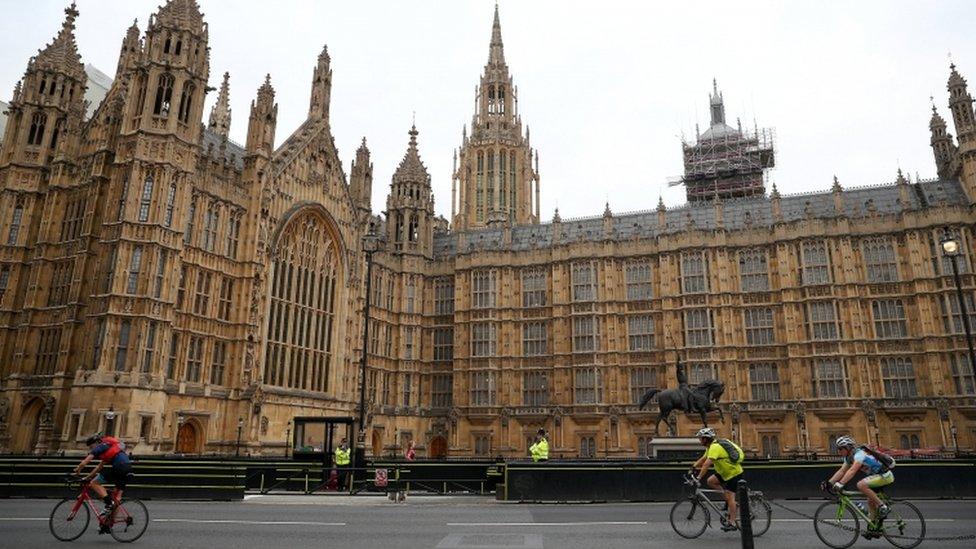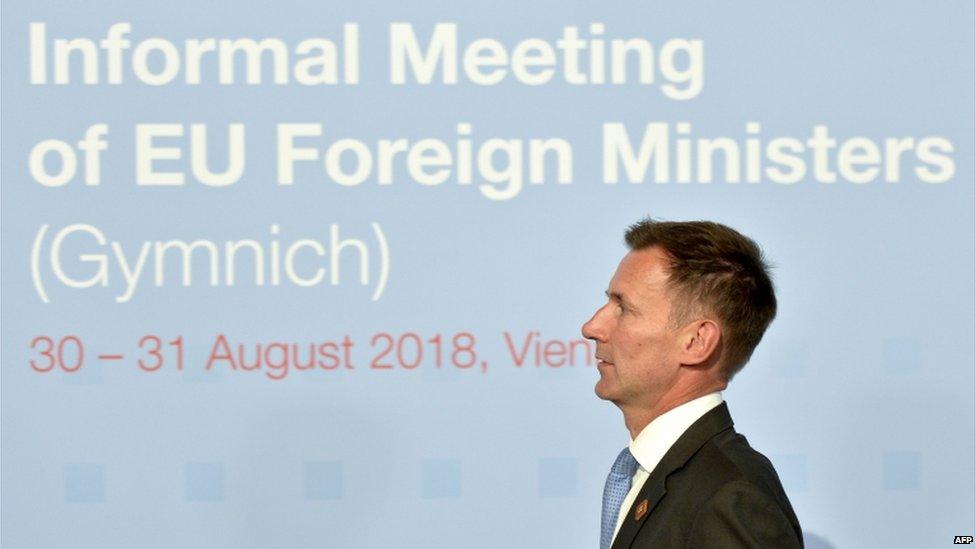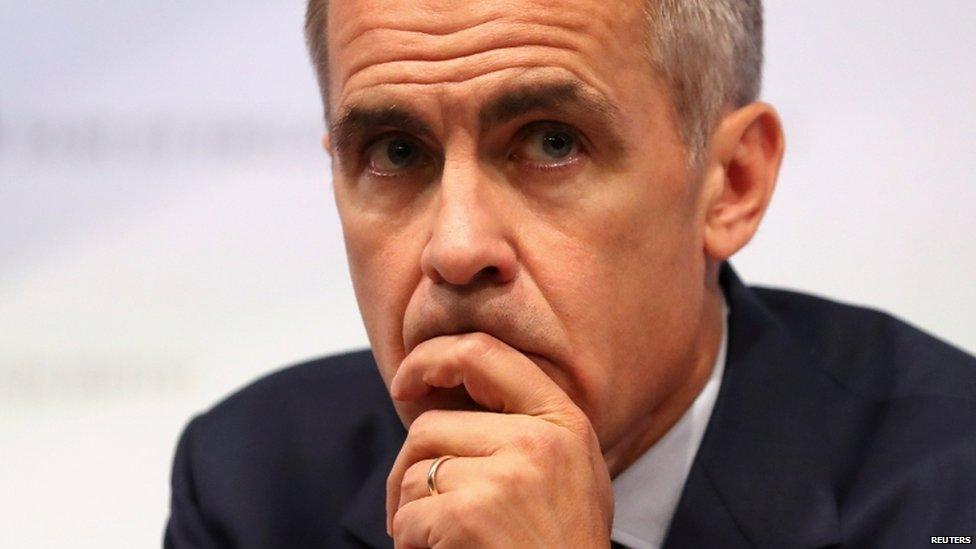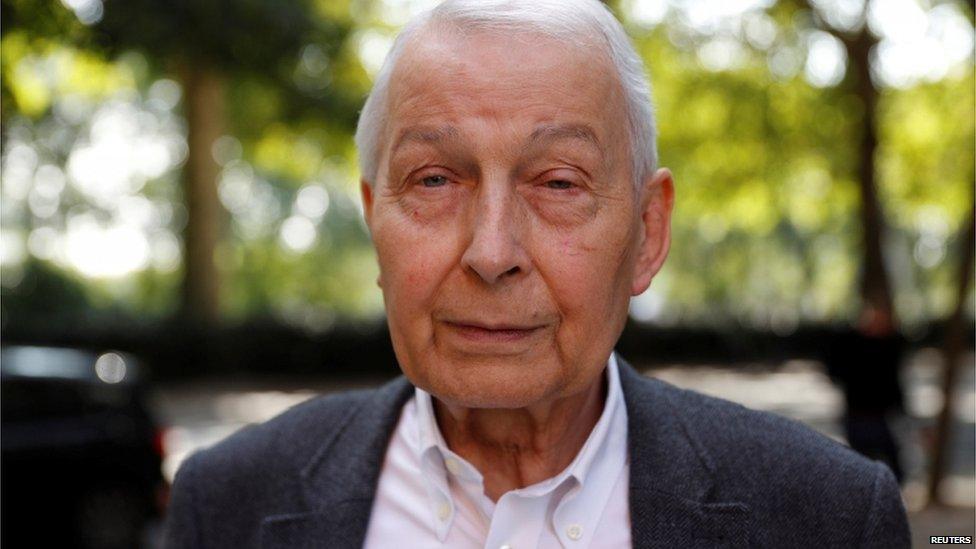Week ahead in Parliament
- Published
- comments

The bells will sound and the doors will be thrown open, but the start of the new parliamentary term will not see eager refreshed MPs crowding back to Westminster to grapple with the challenges which await them.
Rather the reverse.
The Brexit battling and internal feuding barely stopped in either of the main parties, over the summer, and MPs will barely miss a beat as they resume parliamentary duties.
The coming week's agenda is fairly low-key, and I expect the main excitement will come from the optional extras added, at short notice, to each days' proceedings; a statement or urgent question providing an update on the Brexit negotiations looks likely, but will the latest developments be hailed as a triumph or condemned as a sellout?
Probably both. There may be plenty of other issues which prompt a statement or UQ - the scallop wars, the delay in opening London's new Crossrail link, the financial problems in a series of major local authorities...
Meanwhile, events outside might reverberate in the chamber of the Commons; the Labour NEC and parliamentary party are both due to discuss the anti-Semitism row which dominated much of the summer. Will there be agreement, or a bruising confrontation?
And the Liberal Democrat leader, Sir Vince Cable, is due to make a speech in which he is expected to confirm plans to stand down before the next scheduled general election in 2022, and announce his desire to change party rules to allow a successor who is not an MP.
Here's my rundown of the week ahead:
Tuesday 4 September

Jeremy Hunt has been touring European capitals this summer, discussing the UK's Brexit proposals
The Commons returns to action (2.30pm) with the debut of Jeremy Hunt in his new role as foreign secretary at Foreign Office Questions, following his summer tour of European capitals.
And on a day of relatively light legislating, there is plenty of scope for the normal post-holiday crop of ministerial statements and urgent questions.
The day's Ten Minute Rule Bill, from the Stoke MP Ruth Smeeth, pursues a potteries interest, calling for a country of origin marking system for ceramics.
The main legislative action is the second reading debate on the Civil Liability Bill, external - this does two main things; it aims to curb tens of thousands of spurious whiplash claims, in the hope of cutting insurance premiums for motorists, and it also makes important technical changes to the way compensation payments for injuries are calculated, which could have a huge impact on the level of medical negligence payouts, potentially saving the NHS hundreds of millions of pounds, and, of course, leading to smaller settlements for claimants. The bill has already been through the House of Lords.
Proceedings end with an adjournment debate on the Gilligan report on cycling in Oxford and Cambridge, external, led by Oxford Lib Dem MP Layla Moran, but rather cheekily also taking in her party's top target seat of Cambridge. The report for the National Infrastructure Commission is by the former Transport for London cycling commissioner, Andrew Gilligan. It calls for £200m worth of improvements to cycling infrastructure, including new separated cycle tracks on main roads, new off-road routes and remodelled junctions, to boost safety and encourage more cycling.
In Westminster Hall, the SNP's Stuart C. McDonald leads a debate (11.30am) on fees for registering children as British citizens - these are facing a legal challenge because the administrative cost of processing an application is estimated at £372, but the actual fee is now £1,012, producing an estimated profit for the Home Office of £94.24 in the past five years.
Labour's Dr Rupa Huq has a debate on women's rights after the UK leaves the EU (1pm) - she wants to point to the gendered nature of the effects of Brexit, arguing that women have the most to lose. She says rights on maternity (and paternity) leave and pregnancy discrimination all came from the EU.
And at 4.30pm the Labour MP, Wes Streeting, has a debate on TOEIC visa cancellations, external. After the BBC's Panorama programme exposed cheating in some colleges which administer the Test of English for International Communication (TOEIC) for non-EEA students, the Home Office revoked or curtailed the visas of thousands of students it suspected of fraud. The evidence for those visa decisions has been questioned, and Mr Streeting says the Home Office's actions "ruined the lives of many innocent international students".
Labour MP Karen Buck, who chairs the all-party group on Legal Aid, will lead a debate (6.30pm) on the government's post-implementation review of LASPO, the Legal Aid, Sentencing and Punishment of Offenders Act , a Coalition measure which substantially reduced the kind of legal actions which qualified for legal aid, leading to criticism that it had curtailed access to justice. After taking a serious battering in the Lords, the Coalition committed to review the impact of LASPO - but a commitment to complete the review before the 2018 summer recess has slipped.

The governor of the Bank of England will be facing questions from chair Nicky Morgan, and other members of the Treasury Committee
My select committee pick is the Treasury hearing (at 1.15 pm) with the Governor of the Bank of England, Mark Carney, and supporting cast, on the Bank of England Inflation Reports. But keep an eye out for the Defence Committee hearing (4pm) on a statute of limitations to protect veterans from prosecutions for historic offences - the witnesses are ex-army officers Colonel Tim Collins and Colonel Jorge Mendonça.
In the Lords (2.30 pm) expect a bout of irritable peer syndrome over the Taxation (Cross-border Trade) Bill, external - this is an important Brexit measure, creating the legal powers needed to allow the UK to establish and enhance trading relationships around the world after leaving the European Union customs union. But it is being treated as a Money Bill, which means that peers can do nothing more than rubber-stamp it, because MPs retain exclusive control of money matters.
Thus it will go through all its stages of consideration in the Lords in a single gulp - although Labour's Lord Tunnicliffe has put down a Motion to Regret. There is some internal Labour politics around this - with anti-Brexit MPs calling for their party to take a harder line against the bill, even in the Lords.
The day ends with a short debate on UK assistance to Afghanistan and the prospects for peace in that country, led by the former Lord Speaker, Baroness D'Souza.
Wednesday 5 September
The commons meets at 11.30am for Northern Ireland questions, followed, at noon, by Prime Minister's Questions - with any statements or urgent questions following.
Conservative MP Andrea Jenkyns challenges the PM to name the time when Brexit became Remain.
The day's Ten Minute Rule Bill is from the Conservative Pauline Latham - she says it is an anomaly to outlaw forced marriages while continuing to allow children of 16 to be married with the consent of their parents. Her bill would set 18 as the minimum age for marriage.
The main legislating is on the report and third reading stages of the Tenant Fees Bill, external - which will ban letting fees paid by tenants in the private rented sector and cap tenancy deposits in England.
The aim is to reduce the extra costs that tenants can face which can run into hundreds of pounds. The bill has broad cross party support but a key issue is the proposal to cap deposits at six weeks' rent; Labour are calling for it to be four weeks.
Then MPs turn to the report and third reading of the Voyeurism (Offences) Bill, external - the fast-tracked measure to ban "upskirting" which the government introduced after a private member's bill from the Lib Dem Wera Hobhouse was blocked.
Look out for amendments reflecting concerns that the bill as drafted would not catch all upskirting offences. At the moment it outlaws upskirting for sexual gratification, but some MPs suggest this could allow perpetrators to argue they were "having a laugh".
A Tory MP halts the progress of a bill which would make "upskirting" a criminal offence.
Amendments signed by a variety of backbenchers including Women and Equalities Committee Chair Maria Miller would make all "upskirting" an offence including for example paparazzi pictures taken for financial gain, or where the motivation is "group bonding".
A further amendment amendment tackles the issue of distributing upskirting pictures, and makes it an offence to distribute non-consensual upskirting images. Similar amendments could resurface in the House of Lords, if they are not carried by MPs - keep an eye on the influential Crossbench superlawyer, Lord Pannick.
There are some intriguing looking debates in Westminster Hall, starting with the former Attorney-General Dominic Grieve on CCTV for communal areas of care homes (9.30am); Conservative barrister Alex Chalk leads a debate on enforcement of equalities legislation relating to guide dogs (11am); Labour's Lyn Brown has a debate on the government response to organised crime and young people's safety (2.30pm), which will focus on the link between youth street gangs and organised crime; and Labour's Helen Jones discusses the standard of proof for a conclusion of suicide in a coroner's court (4pm).
That is followed by a debate on the findings of the Care Crisis Review (4.30pm) led by the Conservative, Lucy Allan. This is the seven month sector-led review, commissioned after Sir James Munby, President of the Family Division of the High Court of England and Wales, warned that the care system was facing a crisis. Ms Allan has repeatedly argued that, if more money were spent on early intervention and family support, fewer children would go into care, called for the authorities to focus on keeping families together.
On the committee corridor, watch out for the Environment, Food and Rural Affairs hearing (9.30am) with the Fisheries Minister George Eustice - which is bound to see considerable discussion of the scallop wars off Normandy.
At about the same time the Housing, Communities and Local Government Committee will be going through the now familiar exercise of getting to know yet another new Housing Minister (9.45am) - this time the new incumbent in what is supposed to be one of the most important ministerial policy briefs is Kit Malthouse, the former deputy mayor of London, who will be questioned on a key technical issue, Land Value Capture.

Frank Field, who has resigned the Labour whip, is also the chair of the Work and Pensions Committee
And, incidentally, Frank Field, now resigned from the Labour whip, will preside at a meeting of his Work and Pensions Committee (9.30am) on pension costs and transparency. One interesting question is whether, having been elected to a chair allocated to a Labour MP, his right to continue as chair of a key committee will now be challenged. There is no precedent since the introduction of elected select committee chairs.
And finally - Brexit Secretary Dominic Raab and the PM's Brexit advisor Olly Robbins (a figure high in Brexiteer demonology) are before Bill Cash's European Scrutiny Committee (2.30pm). Get the popcorn in.....
In the Lords (3pm) the main business is detailed consideration of the Mental Capacity (Amendment) Bill, external which aims to revamp the current safeguards around deprivation of liberty to prevent harm to the individual.
The government believes the current system is overly technical and legalistic, places significant burdens on people and their families and too often fails to achieve positive outcomes. This bill follows a Law Commission report, and the government says it will create a simpler process with increased engagement with families and other carers, and afford swifter access to justice.
Labour has concerns that the bill fails to secure the rights of autistic people, and is concerned about a legal test of "necessary and proportionate" living arrangement - a change to the current rules which say that a deprivation of liberty has to be in an individual's best interests. This is a committee stage debate - so peers will focus on "probing" the governments intentions and understanding of how their proposals will work, with amendments and actual votes following on in the later report stage, if concerns are not met.
That will be followed by a short debate on the legacy of the Troubles in Northern Ireland, with particular regard to the role of the security forces - led by the former crossbench peer and former Chief of the General Staff, Lord Dannatt.
Thursday 6 September
The Commons opens (9.30 am) with another dispatch box debut - the new Digital, Culture, Media and Sport Secretary Jeremy Wright takes his first question time. Previously he had a relatively low profile role as Attorney General, and now he will be pitched opposite Labour's deputy leader, Tom Watson, who called for an inquiry into Russian interference in the Brexit referendum.
Mr Wright's successor as Attorney General, Geoffrey Cox, then makes his question time debut (10.10am). Expect some mock concern about how the high-earning barrister will scrape by on a ministerial salary.
Then comes the weekly statement on forthcoming Commons business from the Leader of the House, Andrea Leadsom.
After that, the Lib Dem Norman Lamb is in the limelight, first making a statement on his Science and Technology Committee's report on E-cigarettes, external - which compared their harmfulness with that of conventional cigarettes and concluded that they were 95% less harmful than conventional cigarettes, and were being overlooked as a stop smoking tool by the NHS. The committee called for the regulations around e-cigarettes' licensing, prescribing and advertising of their health benefits to be relaxed and for their taxation level to be reconsidered.
Then Mr Lamb leads a debate on Brexit, science and innovation, based on the Science and Technology Committee's report which called for an early agreement on science and innovation as a 'clear 'win-win' for both the UK and the EU, external.
The second backbench debate will be on Global Britain and the international rules-based order - led by the Conservative and chair of the Foreign Affairs Committee, Tom Tugendhat. This focuses on the idea of an alternative post-Brexit approach to world affairs, but in a report in March, external, the committee suggested it needed to go beyond a "superficial rebranding exercise".
The adjournment, led by Labour ex-minister David Lammy is on the treatment of people under immigration control.
In Westminster Hall (1.30pm) Health Committee Chair Dr Sarah Wollaston leads a debate on the committee's report on Integrated care: organisations, partnerships and systems, external, which examines efforts to provide more joined up care as people live longer, and calls for a national transformation strategy backed by secure long-term funding.
At 3pm, Labour's Steve McCabe leads a debate on supporting children in need into adulthood.
In the Lords (11am) there are backbench debate on the NHS and healthcare data and how that data could be used to improve the health of the nation; on plans to ensure that prisons and young offenders institutions are safe and able to meet the rehabilitative needs of those imprisoned; on the case for high-quality careers education and advice to be available to all students and on the report from the International Relations Committee 'The United Nations General Assembly 2018' .
Friday 7 September
The Commons is not sitting, but in the Lords (from 10am) they're reprising a golden oldie, with continued committee stage debate on the House of Lords (Hereditary Peers) (Abolition of By-Elections) Bill, external.
This is the latest attempt by Labour's Lord Grocott to abolish the system of by-elections which top up the contingent of 92 hereditary peers who sit in the Lords, when one of their number retires or ascends to the celestial senate. And whenever Lord Grocott (or indeed anyone else) attempts this, the Conservative ex-minister Lord Trefgarne attempts to block him.
In this instance he has put down a Motion to Regret. And thus the debates that have raged since Lord Steel first attempted to let natural wastage erode the hereditaries will repeat themselves again.
Next comes the second reading of the Mental Health Units (Use of Force) Bill, external - Baroness Massey of Darwen will pilot the private member's bill from her Commons Labour colleague, Steve Reed.
The bill, sometimes called Seni's Law, would to restrict the use of force against patients in mental health units, and require NHS trusts to increase transparency about the restraint of patients, including making police officers wear body cameras when dealing with vulnerable people. It is named after Olaseni Lewis, who died in September 2010, after being restrained by police officers at Bethlem Royal Hospital in London.
The bill is supported by the government and is expected to become law.